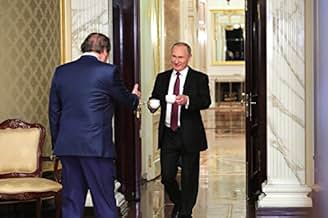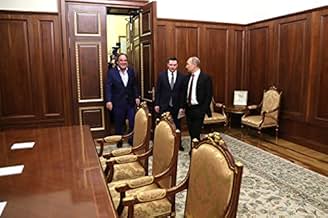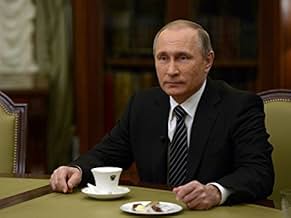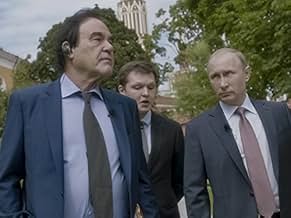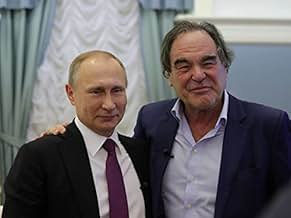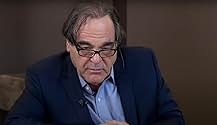VALUTAZIONE IMDb
7,4/10
5447
LA TUA VALUTAZIONE
Il regista Oliver Stone intervista il presidente russo Vladimir Putin su alcune questioni controverse nei rapporti tra USA e Russia.Il regista Oliver Stone intervista il presidente russo Vladimir Putin su alcune questioni controverse nei rapporti tra USA e Russia.Il regista Oliver Stone intervista il presidente russo Vladimir Putin su alcune questioni controverse nei rapporti tra USA e Russia.
- Candidato a 1 Primetime Emmy
- 2 candidature totali
Sfoglia gli episodi
Recensioni in evidenza
If I were to rate this on candor, I'd have to put it closer to a 1 or a 2. I will give it a 4 just because Stone captured a record of what spews from the subject's mouth. I read the transcript, then I watched a bit of the show, then I looked at specific parts of the transcript. This is a "snow-job." Putin is cunning. He presents his circumstances and his views in a noble fashion here. But, these philosophies are contradicted by his actions -- his alleged killings of his perceived opponents -- some living in exile in foreign countries, no less -- by extremely dangerous and reckless means ((Polonium-210, Novichok nerve gas, etc.) causing injury to innocent bystanders (citizens of foreign and sovereign nations). So, what's his excuse? If he ordered the hits of Litvinenko, Skripal, and others, then everything he says is garbage, because he doesn't believe what he says. If he didn't order these hits, then he does not have control of the State apparatus; he would lack integrity, thus credibility, and therefore may just be incompetent. Either way, how can this fabricated persona be meaningful?
I was kind of expecting in what direction this movie was going to go! Given that i have seen some movies from Mr. Stone and his documentaries, i knew this wasn't going to be attack as the Western journalists do. I saw it as a chance given to someone to explain himself without the need to battle with the journalists. After all when you get accused of something an go in front of a court, you are given a chance to tell your version of a story. Innocent until proved guilty! If you want to see both sides of the story, you should definitively see it! After that make your own opinion!
Oliver Stone's The Putin Interviews is
garbage. Stone, though respected as a filmmaker, at least for some of his earlier works, loses all credibility with this attempt at a "documentary". This four-part series is not a documentary, and it cannot be called journalism either. Is just a platform that Putin uses to justify to the world his policies, in his own manner of course: politically correct at times, even diplomatic, but with some subtle/not-so-subtle references, even irony when needed. Stone as an interviewer is practically useless. His questions are at times obviously ill-prepared, but, more annoying is his way of asking something by providing the way in which the question could be dodged. Not that Putin needs help with that. He has a lot of practice with his annual Valdai Club's meetings, Direct Lines and call-in shows. All of this while witnessing Stone's anti-Americanism and admiration for everything that is Russia or Russian. In the end we do not learn anything new. To be avoided.
This documentary is very well-done and shows a side of Putin and Russia that is rarely seen by people here in the US. The mainstream media and most people here in America have a strong negative association to Russia, often times without actually even knowing very much about Russian history. It's refreshing to see someone taking the time to try to understand rather than simply condemn Putin and the Russian people. Highly recommend It.
Enjoyed this immensely. Great to hear another side of recent history from one of the protagonists. Probably wouldn't go for drinks with Putin but he certainly knows how to explain his point of view within the current world order. So refreshing for a leader to explain his political position/opinions with historical references and not needing to hide behind tweets to defend decisions that have little thought behind them and even less support. Mr. Stone, although not a heavyweight interviewer, manages to cover areas of interest to the American media/audience while at the same time allowing Putin to give an insight into the problems facing his country and how absurd he considers the time wasting and unfounded accusations leveled at Russia for meddling in the 2016 US Presidencial Election. Well done Mr. Stone.
Lo sapevi?
- QuizOliver Stone interviewed Russian president Vladimir Putin over a span of two years in different locations in Russia: the Kremlin, Sochi and Putin's official residence in Moscow.
- Citazioni
Oliver Stone: Do you ever have bad days?
Vladimir Putin: I'm not a woman, so I don't have bad days.
Oliver Stone: There you go. Now you're gonna insult 50 percent of the American public. The way they're gonna take it.
Vladimir Putin: I'm not trying to insult anyone. That's just the nature of things
- ConnessioniFeatured in Good Morning Britain: Episodio datato 13 giugno 2017 (2017)
- Colonne sonoreSerenade for Strings
I più visti
Accedi per valutare e creare un elenco di titoli salvati per ottenere consigli personalizzati
- How many seasons does The Putin Interviews have?Powered by Alexa
Dettagli
- Data di uscita
- Paese di origine
- Sito ufficiale
- Lingue
- Celebre anche come
- Putin enligt Oliver Stone
- Luoghi delle riprese
- Mosca, Russia(Setting of the Putin interviews)
- Aziende produttrici
- Vedi altri crediti dell’azienda su IMDbPro
- Tempo di esecuzione
- 1h(60 min)
- Colore
Contribuisci a questa pagina
Suggerisci una modifica o aggiungi i contenuti mancanti

